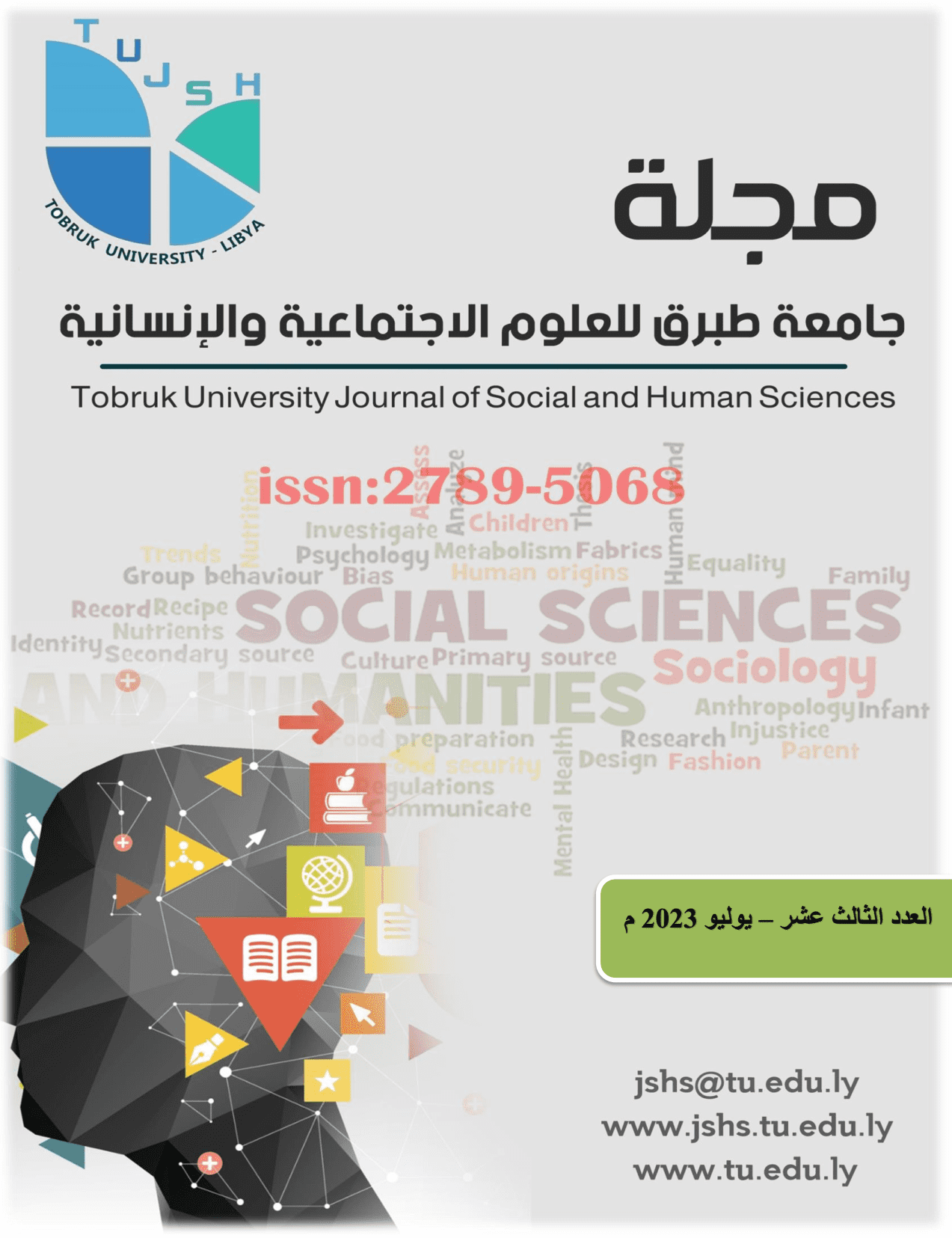قياس مستوي التوجه الريادي للمشروعات الصغيرة ومتناهية الصغر واستراتيجياتها خلال جائحة كورونا في البيئة الليبية
DOI:
https://doi.org/10.64516/5hq3hz17Keywords:
التوجه الريادي, استراتيجيات المواجه, جائحة كورونا, المشروعات الصغيرة ومتناهية الصغرAbstract
This study aimed to measure the level of entrepreneurial orientation among small and micro enterprises operating in the city of Tobruk during the Corona pandemic. In addition to measuring the coping strategies applied by these enterprises to face the negative effects resulting from the Corona pandemic. Entrepreneurial orientation was measured through three dimensions: Innovativeness, Proactiveness, and Risk-Taking. While coping strategies were measured through three strategies: the strategy of reducing expenditures, the strategy of continuing the current activity, and strategic reorientation. Using the quantitative approach, the study showed that micro and small enterprises do not have an entrepreneurial orientation, as these enterprises did not move to change their direction. This is evident through coping strategies, only these enterprises chose the strategy of reducing expenses while continuing the current activity as an option to confront the Corona pandemic. The study presented a set of implications, especially the National Program for Small and Medium Enterprises, to enhance the ability of micro and small enterprises to develop and survive.
Downloads
References
1. أبو داود، سلمي. (2021). دور التوجه الريادي في تنمية رأس المال البشري من وجهة نظر العاملين في الكليات الجامعية بغزة (رسالة دكتوراه، جامعة الاقصي).
2. أبوشامة، أسماء محمود خليل. (2022). دور التوجه الريادي للجامعة في تطوير جدارات التعلم التنظيمي "دراسة تطبيقية على الجامعات المصرية". مجلة البحوث التجارية. ص ص DOI: https://doi.org/10.21608/zcom.2022.132620.1137
3. المحمود، سعد؛ ابراهيم، رنكين؛ حسن، زيرك (2019) دور التوجه الريادي في تحقيق ابتكار القيمة لدى المصانع الانتاجية دراسة استطلاعية لآراء عينة من المديرين في عدد من المصانع الإنتاجية في محافظة. المجلة الاكاديمية لجامعة نوروز. ص ص.156-179 DOI: https://doi.org/10.25007/ajnu.v8n1a314
4. مهدي، رامال كاظم. (2022). أثر العلاقة بين القيادة التكيفية والأداء المتميز على التوجه الريادي. مجلة كلية التربية للبنات للعلوم الانسانية , 4(29). ص ص 469-520 DOI: https://doi.org/10.36327/ewjh.v4i29.12728
5. Bressan, A., Alonso, A. D., & Kok, S. K. (2021). Confronting the unprecedented: Micro and small businesses in the age of COVID-19. International Journal of Entrepreneurial Behavior & Research, 27(3), 799–820. DOI: https://doi.org/10.1108/IJEBR-09-2020-0602
6. Covin, J. G., & Slevin, D. P. (1989). Strategic management of small firms in hostile and benign environments. Strategic Management Journal, 10(1), 75–87. DOI: https://doi.org/10.1002/smj.4250100107
7. Ebersberger, B., & Kuckertz, A. (2021). Hop to it! The impact of organization type on innovation response time to the COVID-19 crisis. Journal of Business Research, 124, 126–135. DOI: https://doi.org/10.1016/j.jbusres.2020.11.051
8. Eggers, F. (2020). Masters of disasters? Challenges and opportunities for SMEs in times of crisis. Journal of Business Research, 116, 199–208. DOI: https://doi.org/10.1016/j.jbusres.2020.05.025
9. Emami, A., Ashourizadeh, S., Sheikhi, S., & Rexhepi, G. (2021). Entrepreneurial propensity for market analysis in the time of COVID-19: Benefits from individual entrepreneurial orientation and opportunity confidence. Review of Managerial Science. DOI: https://doi.org/10.1007/s11846-021-00499-0
10. Field, A. (2009). Discovering statistics using SPSS: Sage publications
11. IGI Global (2023). What is Micro and Small Enterprises (MSEs). accessed at: https://www.igi-global.com/dictionary/micro-and-small-enterprises-mses/65276
12. Kirtley, J., & O´Mahony, S. (2023). What is a pivot? Explaining when and how entrepreneurial firm decide to make strategic change and pivot. Strategic Management Journal, 44(1), 97–230. DOI: https://doi.org/10.1002/smj.3131
13. Krishnan, C. S. N., Ganesh, L. S., & Rajendran, C. (2022). Entrepreneurial interventions for crisis management: Lessons from the COVID-19 pandemic’s impact on entrepreneurial ventures. International Journal of Disaster Risk Reduction, 72, 1–23. DOI: https://doi.org/10.1016/j.ijdrr.2022.102830
14. Lumlikin, G.T., &amli; Dess, G.G. (1996). Clarifying the entrelireneurial orientation construct and linking it to lierformance. Academy of Management Review 21(1), 135-172. DOI: https://doi.org/10.2307/258632
15. Meyer, K., Prashantham, S., & Xu, S. (2021). Entrepreneurship and post-COVID-19 recovery in emerging economies. Management and Organization Review, 17(5), 1101–1118. DOI: https://doi.org/10.1017/mor.2021.49
16. Puumalainen, K., Sjögrén, H., Soininen, J., Syrjä, P., & Kraus, S. (2023). Crisis response strategies and entrepreneurial orientation of SMEs: A configurational analysis on performance impacts. International Entrepreneurship and Management Journal, 1-33. DOI: https://doi.org/10.1007/s11365-023-00847-4
17. Salmony, F. U., Kanbach, D. K., & Stubner, S. (2022). Entrepreneurs in times of crisis: Effects of personality on business outcomes and psychological well-being. Traumatology, 28(3), 336–351. DOI: https://doi.org/10.1037/trm0000359
18. Sharma, G. D., Kraus, S., Liguori, E., Bamel, U. K., & Chopra, R. (2022). Entrepreneurial challenges of COVID-19: Re-thinking entrepreneurship after the crisis. Journal of Small Business Management. DOI: https://doi.org/10.1080/00472778.2022.2089676
19. Souisa, W. (2018). The effects of entrepreneurial orientation and market orientation on business performance. Journal of Entrepreneurship Education, 21(4), 1-6.
20. Zarook, T., Rahman, M. M., & Khanam, R. (2013). Does the financial performance matter in accessing to finance for Libya's SMEs?. International Journal of Economics and Finance, 5(6), 11-19. DOI: https://doi.org/10.5539/ijef.v5n6p11
21. Zighan, S., Abualqumboz, M., Dwaikat, N., & Alkalha, Z. (2021). The role of entrepreneurial orientation in developing SMEs resilience capabilities throughout COVID-19. International Journal of Entrepreneurship and Innovation. Advance online publication. DOI: https://doi.org/10.1177/14657503211046849
22. Wentzel, M., Stanske, S., & Lieberman, M. (2020). Strategic response to crisis. Strategic Management Journal, 42(2), 16–27.
Downloads
Published
Issue
Section
License
Copyright (c) 2023 أ . حسام محمد عمر (Autor/in)

This work is licensed under a Creative Commons Attribution 4.0 International License.








